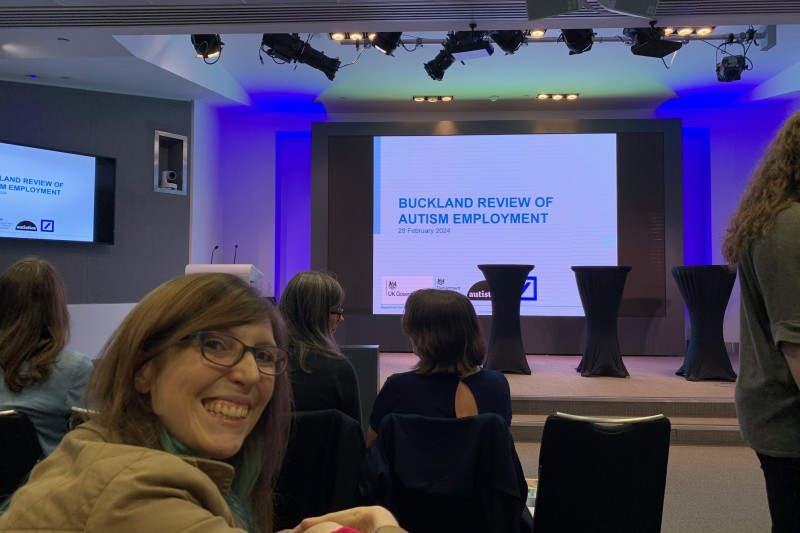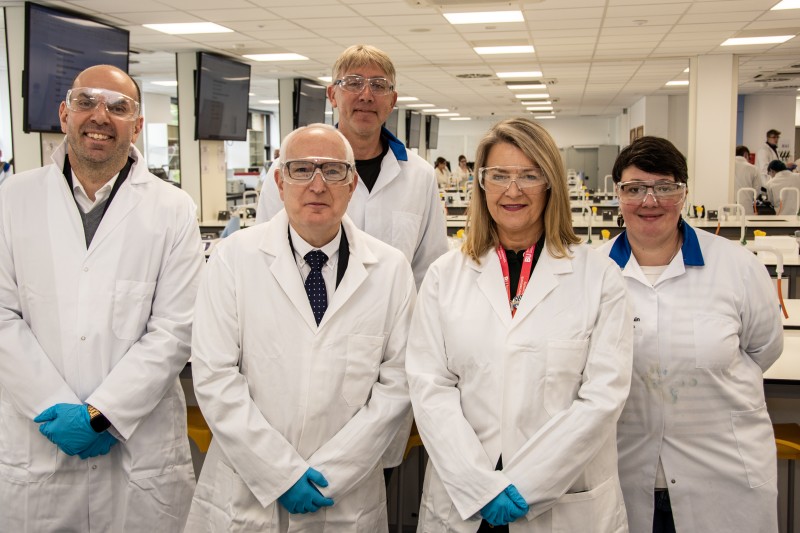Dr Rachel Moseley is a Principal Academic in Psychology at Bournemouth University, specialising in autism. Dr Moseley’s blog gives reflections on her contributions to the Buckland Review into employment prospects for autistic people.
I jumped at the chance to contribute to the Buckland Review on autism and employment. My research and professional activities centre on understanding and improving the mental health of autistic people, a marginalised and vulnerable group at higher risk of suicide. Since many factors influence our mental health, I’ve been able engage with policy-makers on a range of topics relevant to wellbeing for autistic people. In addition to contributing to NHS England’s draft guidelines for mental healthcare for autistic people, my written evidence about autistic women was published by the Women and Equalities Committee; I’ve also spoken to the Menopause APPG about the difficulties faced by autistic women at this time of life, and asked them to pose some parliamentary questions.
Employment is critically important for mental health, for bestowing a sense of self-worth and purpose, and for social connection to a wider community - things that autistic people often lack, and which my research has linked to their suicidal thoughts. Helping autistic people find and sustain fulfilling and meaningful employment will change, and likely save, lives. As such, I’ve taken opportunities to help in this area by recommending edits to Commons Library information about autism and employment, and submitting written evidence about the transition from education to employment for the Public Services Committee.
Giving evidence to the Review
The Buckland Review, conducted by former Justice Secretary, the Rt Hon Sir Robert Buckland KC MP, is an independent review commissioned by the Government. It aims to make policy recommendations to improve employment prospects for autistic people. Systemic disadvantages mean that autistic people have among the lowest rates of employment among disabled people (Office of National Statistics, 2021). Similarly, autistic higher education (HE) graduates are the least likely of any disabled group to be employed 15 months after graduation (Association of Graduate Careers Advisory Services, 2021), a statistic that was missing from the Commons Library until I pointed it out.
I have previously been concerned by changes made by the Department for Work and Pensions (DWP) to personal independence payments and other disability benefits, changes which, as other sources have pointed out, will force many autistic people into workplaces that are unsuitable and ultimately unsustainable. Far from the Government’s claim that these changes will “remove barriers to work”, they may, through forcing people through cycles of unsuccessful work placements, actually cause significant harm to health and wellbeing. I was passionate to convey to the Buckland Review that we need to think beyond getting autistic people into work – we need to think about keeping them there.
I attended the roundtable virtually in July 2023. I was proud to be a representative of Bournemouth University, which is a partner in the ATech Policy Lab that collaborated with the Review’s secretariat to hold one of the evidence sessions. The roundtable included politicians, employers, charities, and autistic people sharing their experience of employment. I learnt a lot from listening, and made many comments in the chat function, sometimes sharing resources and research papers which were ‘liked’ by attendees.
When I got the opportunity to speak, I emphasised that one of our top priorities needs to be changing workplace culture, which autistic people have already pointed out is the most important form of workplace adaptation. I emphasised then (and in my submitted notes) that autism acceptance training for employers and staff should be prioritised, that it should be strengths-based, neurodiversity-affirmative and co-created with autistic people, and that it should recognise issues associated with intersectionality (such as difficulties experienced by autistic women in the workplace). I also emphasised that training for employers should include training on management style and mentoring; that remote and flexible work needed to be more accessible; that employment support services needed improving, along with more opportunities for work experience; and directed the enquiry towards examples of good practice, such as coaching.
Seeing the impact
On its release, I was pleased to see the Review acknowledge these unacceptable statistics - and to recognise the connection between employment difficulties, suicide and mental illness in autistic people (page 14). I was even more pleased to see that the Review succeeded in foregrounding the most important change asked for by autistic people – that of challenging prejudices that employers might hold about autistic people, and changing the culture of workplaces (Part 3, page 17). The national campaign suggested in the Review (suggestion 1 of pages 4 and 19) is strengths-based, demonstrating to employers the skillsets that autistic people can bring to a workplace. Changing the narrative about autistic people should not only help autistic people into work, but may go some way to making work sustainable.
In Part 4 (page 21), the Review recognises, as I and others emphasised, that autistic people will require emotional and social support to enter and stay in employment. The evidence base and consequent recommendations (pages 22-24, 25) highlight the crucial importance of building confidence and experience during and beyond the years autistic people are in the education system, and upskilling autistic people with schemes like apprenticeships and internships. It was good to see intersectionality recognised in this section, which highlighted unique challenges of autistic girls and women and emphasised the need for flexible, adaptable support.
Part 5 focuses on recruitment and reasonable adjustment processes, and I was relieved to see, in recommendation 9, recognition that autism training is desperately needed in key workers who support people into employment – in my written evidence, I pointed out that the autism understanding of Jobcentre Plus staff was rated as among the worst of any professionals (National Autistic Society, 2021). Parts 5 and 6 recognise that, as I noted in my written statement, previously the onus has been on autistic people to self-advocate for and suggest their own reasonable adjustments (point 2.17, page 14; also page 28). The recommendations here, particularly perhaps number 18, would hopefully relieve this burden somewhat.
At several points, the Review recognises the need to “mak[e] inclusion the default” (pages 19, 27, 32). This is not only good news for autistic people scared of the disclosure which is necessary for reasonable adjustments, but could also benefit the many, many autistic people who are not currently diagnosed. The reach of many employability initiatives is only so far as individuals who have been identified and clinically diagnosed as autistic. This is problematic because while approximately 1% of the UK population are known to be autistic, a recent study suggested that undiagnosed autistic people may constitute approximately another 1-2% of the English population. Many people wait for years for a specialist autism assessment through the NHS; depending on random postcode lotteries, diagnosis for adults is simply not offered in some places. This is especially worrying given that undiagnosed autistic people typically have higher rates of mental illness and suicidality – and of course, without that all important diagnosis, they cannot access employment or any other autism-related support. It is in the Government’s interest to get these individuals diagnosed and accessing support, since they are naturally contributing to the economic strain on the health system and DWP, even while not recognised as autistic. In this way, employment-focused improvements really need to go hand in hand with improved access to diagnosis.
Going further
For all that is good about the Review – most notably the involvement of autistic people and those who champion their cause, like the charity Autistica – some parts aroused my scepticism. I felt that in places, the Review diminished itself and the scale of the need in its eagerness to assure the reader that these recommendations do not require funding injections or changes to legislation. It does not ask the Government to commit to investment in addressing crucial problems related to autistic employability, like the need to train key staff in autism awareness. While the Review is full of good will, it is questionable whether this being “the moral thing to do”, as asserted in the presentation at the launch, will actually motivate organisations to make potentially costly, potentially ‘inconvenient’ changes. Many autistic people feel abandoned by services in a society that does not accept them, and I query whether the Review does enough to hold the Government to account and demand action on their behalf. This concern may be shared by organisations like Ambitious About Autism, who are calling on the Government to make legal changes to ensure young autistic people are supported out of school and into employment. The National Autistic Society, too, have pointed out that radical transformation is really needed, and Diversity & Ability, on X, ask the Government to “do better” on issues such making Access to Work easier to navigate for claimants.

I plucked up all my courage and made this point during the question and answer session at the launch. It was an event like nothing I’ve ever attended, having had little exposure to in-person policy events. After the talks, fuelled by I-don’t-know-what kind of adrenaline, my hand shot up in the air. Sir Robert’s response was not entirely convincing: it tended along the ideological line around legislation and a “slug of money” not being what is needed at present. You can trust an autistic person to ‘cut through the crap’, and CEO Mr James Cusack of Autistica gave a more pragmatic response: the Review focused on what was achievable now. Through the rest of the questions, the panel referred to me and my question by name (“the challenge set by Rachel”), and my face was burning; I wanted to sink through the floor, but I was glad I’d said it.
Time will tell whether the Buckland Review will succeed in enacting its proposed “wave of improvement, starting from small ripples”. The good will of all involved was undeniable, but I remain concerned that much greater commitment is required – in employment and in adjacent areas, like diagnostic pathways – to really address the inequality here.



